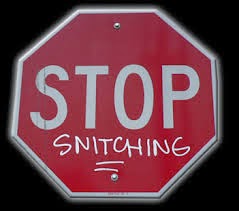Don’t tattle on a friend or a family member for driving your car.
Many drivers ask: What if you receive a red light camera ticket, and the driver wasn’t you?
This is where snitch tickets come in. These are unofficial, misleading notices sent to registered vehicle owners to pressure them into identifying who was driving at the time of a red light violation. They are not enforceable citations—but they look so real that many people mistake them for genuine tickets.
Why Snitch Tickets Exist
Red light camera tickets in California cost about $500 and add a point to your license. That point can raise your insurance rates for years.
Because of the steep consequences, police must identify the actual driver before a citation can be filed in court. Since the camera only captures the license plate, and not always a clear image of the driver, officers and vendors use snitch tickets to get the registered owner to “snitch.”
Technicians reviewing red light photos often look for:
-
Male/female mismatches with the registered owner.
-
Age differences that make the driver obviously not the RO.
-
Rental or company cars with multiple potential drivers.
When they can’t make a clear match, they send out a snitch ticket that mimics a citation but carries no legal authority.
How to Spot a Snitch Ticket
Snitch tickets are intentionally designed to look like the real thing. But there are critical differences:
-
No “Notice to Appear.”
Real tickets always include this language. -
No Court Seal or Case Number.
A valid citation includes both. Snitch tickets leave them out. -
Small Print Disclaimer.
Look closely. On the back, many say: “Do not contact the court.” -
Vendor Website or Address.
They often direct you to sites like PhotoNotice (Redflex) or ATS, not your local court.
According to this guide, snitch tickets are recognizable because they don’t include a court’s address and explicitly tell you not to contact the court.
Real Tickets vs. Snitch Tickets
It’s essential to know the difference:
-
Real Ticket: Filed with the court, carries legal penalties, requires you to respond, and can impact your DMV record.
-
Snitch Ticket: Never filed with the court, has no penalties, and can safely be ignored.
A real citation will eventually be followed by a Courtesy Notice, directing you to contact the court. Even if the contact info looks incomplete, check directly with the official court website.
Some cities have even left off phone numbers or addresses from real tickets to make it harder for defendants. If in doubt, always verify on the court’s website—not the vendor’s.
What Should You Do If You Receive One?
If you receive what you suspect is a snitch ticket:
-
Ignore It. Snitch tickets carry no legal consequences.
-
Don’t Incriminate Yourself. You are under no legal obligation to identify who was driving.
-
Verify With the Court. If it’s not in the court’s system, it’s not real.
Some drivers even choose to challenge real citations using a trial by written declaration, but with snitch tickets, ignoring is usually best.
Why They Are Controversial
Snitch tickets have caused public outcry for several reasons:
-
Deception. They look almost identical to real tickets.
-
Privacy Concerns. They pressure people into snitching on family or friends.
-
Erosion of Trust. People feel tricked, which undermines confidence in law enforcement.
-
Revenue Motivation. Critics argue they are about money, not safety.
Groups like Safer Streets L.A. and consumer advocates have repeatedly called for these practices to be banned outright.
Are Snitch Tickets Legal?
The answer is complicated. They are not illegal because they don’t demand payment directly. But they also aren’t enforceable because they are not filed with the court.
California courts have been clear: only an official citation filed with the Superior Court is valid. Snitch tickets are essentially scare tactics.
How Much Do Real Red Light Camera Tickets Cost?
In California, a real red light camera citation is expensive:
-
Around $500 fine.
-
One DMV point, which can increase insurance rates.
-
Possible traffic school requirements.
Because these penalties are so steep, police departments use snitch tickets to boost their success rate in issuing enforceable tickets.
How to Protect Yourself
-
Educate Yourself. Know the signs of a fake ticket.
-
Don’t Respond. Snitch tickets gain power only if you reply.
-
Check Court Records. Call or search the court website.
-
Consult an Attorney. If you’re unsure, traffic lawyers can confirm whether your notice is real.
The Future of Snitch Tickets
Awareness is spreading, and as more drivers learn their rights, snitch tickets lose their effectiveness. Some cities have already stopped using them due to lawsuits and backlash.
But as long as red light camera programs remain profitable, vendors may continue using snitch tickets as a tactic.
The broader debate is whether traffic enforcement should be outsourced to private companies that profit from citation volume. Until that question is resolved, snitch tickets will likely remain part of the landscape.
FAQs About Snitch Tickets
Q: Can I be fined for ignoring a snitch ticket?
A: No. Since it’s not filed with the court, there are no consequences.
Q: Do I have to identify the driver?
A: No. You’re under no obligation to snitch on yourself or anyone else.
Q: How do I tell if it’s real?
A: Look for a court seal, case number, and “Notice to Appear.” Call your local court to confirm.
Q: Can snitch tickets affect my driving record?
A: No. Only official court-filed citations can impact your record or insurance.
Q: Why do cities allow them?
A: They help identify drivers, which means more valid tickets and more revenue.
Conclusion
Snitch tickets are fake notices designed to trick vehicle owners into identifying who was behind the wheel during a red light violation. They look like real tickets but lack court authority, carry no penalties, and can safely be ignored.
The key rule: If it’s not filed with the court, it’s not real.











